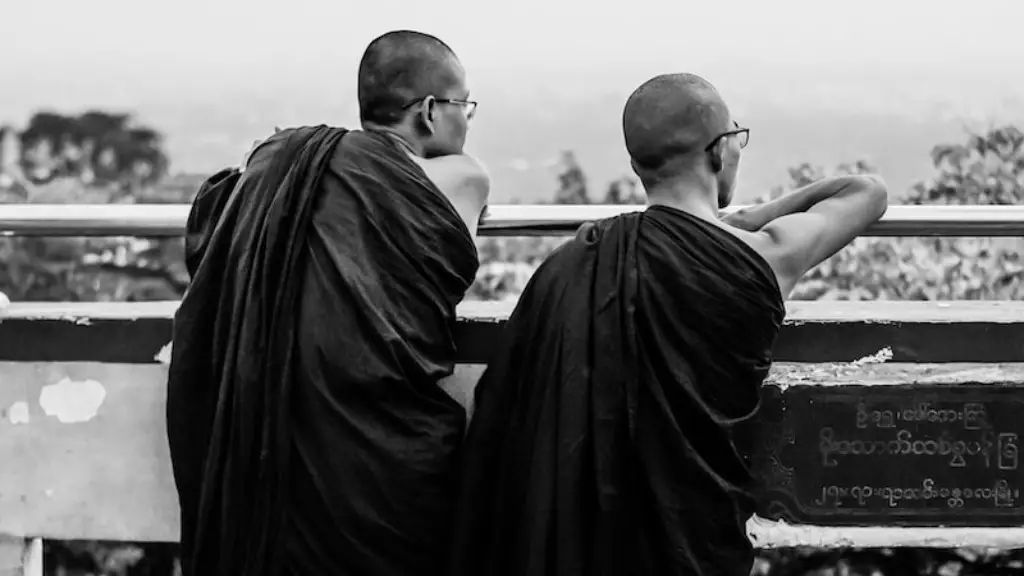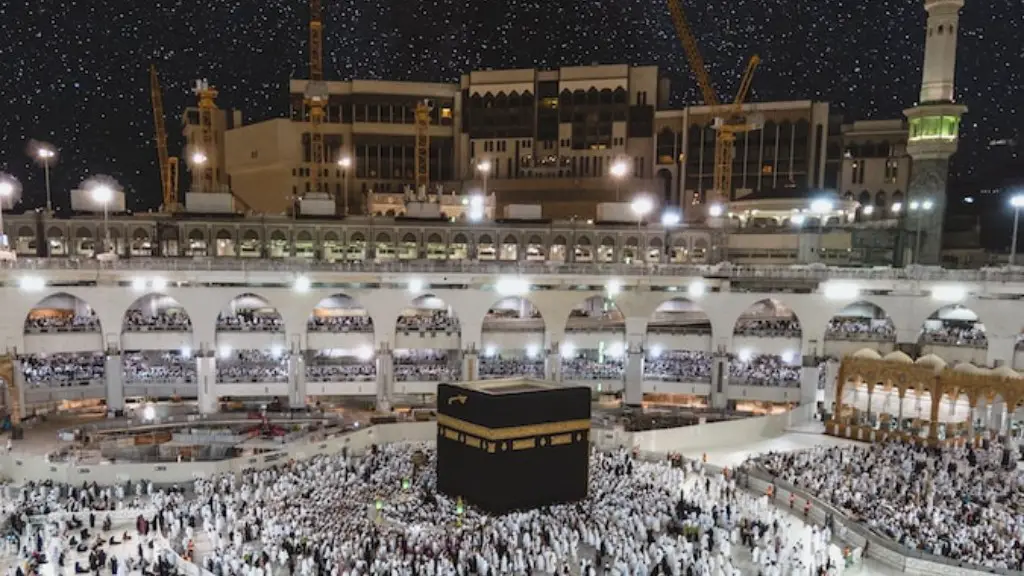Hinduism is one of the oldest living spiritual customs that believes in multiple gods and goddesses. This ancient belief has long been thought to be polytheistic. But many Hindus claim the Vedas, their sacred texts, teach them there is actually only one god and that all their gods are simply manifestations of this single god. With that in mind, many people have asked the question, how many gods are worshipped in Hinduism? To understand this question better, it is necessary to look at some of the core beliefs of Hinduism.
According to Hinduism, God is the source of all creation. The Hindus believe that this one God has many different aspects, which are called upon for different things. This means that the number of gods worshipped in Hinduism can depend on how the individual Hindu interprets God and how they pray to Him. Although there are many gods and goddesses, Hindus focus on three primary gods, known collectively as the Trimurti. These are Brahma the Creator, Vishnu the Conservator and Shiva the Destroyer.
Although these three primary gods are worshiped more widely than the other gods in Hinduism, there are other gods and goddesses who are also respected and venerated as well. These include Ganesha, the god of wisdom and success, Lakshmi, the goddess of fortune and wealth, and Saraswati, the goddess of learning and knowledge. The most important thing to remember is that no single god is considered to be supreme or greater than any other, as they all contribute to the power and energy of the divine.
It should also be noted that Hinduism is not restricted to the worship of the gods in the Trimurti. There are some Hindus who worship saints and other spiritual figures, while others choose to focus on particular deities, such as Shiva, or particular forms of the divine, like Shakti. There are also some who choose to follow what is known as “bhakti”, which is a more personal form of worship.
In conclusion, it is clear that there is no definitive answer to the question of how many gods are worshipped in Hinduism. Instead, the number of gods depends on the individual Hindu and their spiritual beliefs. Different Hindus may choose to focus on different gods or forms of the divine, and this will ultimately depend on their own personal spiritual path. It is also worth noting that, although there are many gods in Hinduism, each one of them is believed to be an aspect or manifestation of the same divine being.
The Different Deities in Hinduism
As mentioned previously, there are numerous gods and goddesses in Hinduism, and these can vary depending on the individual. For instance, some of the more popular deities include Hanuman, the monkey god; Kali, the goddess of time and death; and Indra, the god of rain and thunder. Additionally, some Hindus may also worship the goddess Amba and her consorts, the eight Vasus. Furthermore, each of these gods and goddesses may have specific stories or attributes associated with them, and it is these stories and attributes that can draw some Hindus closer to one particular deity.
Of course, it is also important to note that although there are many gods and goddesses in Hinduism, their stories and roles can overlap. For example, Lord Shiva is known as the destroyer as well as the protector, and Ganesha can also be seen as an embodiment of wisdom and success. Similarly, Lakshmi is not only seen as the goddess of wealth, but she is also associated with purity and loyalty, and Saraswati is not only the goddess of knowledge and learning but can also provide spiritual guidance. Ultimately, this further emphasizes the idea that all the gods and goddesses of Hinduism, regardless of their individual stories or attributes, are ultimately facets of the same source.
In Hinduism, each deity usually has various symbols or attributes that are used to represent them. For instance, Ganesha is often depicted with an elephant head, Lakshmi with lotus flower, and Shiva with a trident. Additionally, these symbols can be used as powerful tools in times of need, and one often sees these signs and symbols used in divination and ritual practices.
Hinduism can also be quite complex when it comes to the worship of gods and goddesses. Depending on personal beliefs and which deity they choose to focus on, some Hindus may choose to do many rituals out of devotion to their chosen deity or perform specific rites during particular festivals, while others may keep a simpler form of worship or pay less attention to symbolism. Ultimately, it is up to the individual to decide which gods they wish to honour and how.
The Significance of Hinduism
The ancient spiritual tradition of Hinduism is an incredibly complex belief system. It is also important to recognize that the faith evolved over a long period of time, and this system of worship has changed and adapted to fit the spiritual needs of each generation. Through the centuries, many people have come to recognize and respect the importance of Hinduism and its gods and goddesses, even if they don’t follow the faith themselves.
In modern times, Hinduism is often seen as a religion of peace and acceptance. Its gods are seen as varied and powerful, but ultimately part of a singular divine being. And its emphasis on the individual’s spiritual journey and the exploration of the divine is something that many appreciate in the faith because it allows them to have their own personal experience of the divine power.
As a result, Hinduism has a long and far-reaching history and has provided comfort and spiritual guidance to many. For this reason, it is important to recognize and respect Hinduism, even if we don’t share its beliefs and practices. And, although the exact number of gods and goddesses that are worshipped in Hinduism is not fixed, the faith itself remains an important and profound religion.
Rituals and Practices in Hinduism
There are a number of rituals and practices associated with Hinduism, and these will vary depending on the individual and their chosen deity. Some of the more popular Hindu rituals include pujas, which are ceremonies that focus on praying to a particular god or goddess; yajnas, which are sacrificial offerings to the gods; and the wearing of religious symbols. Additionally, Hindus may also observe specific festivals, such as Diwali and Holi, when particular gods are worshiped, and these can be seen as powerful tools in times of need.
Hindus also have mantras and sacred texts which are often used in rituals. These may include chants, scriptures, prayers, and various symbols that depict various gods or goddesses. Furthermore, there are various symbols and images in Hinduism, such as the lotus flower, the Swastika, and the Om symbol. Each of these have specific spiritual meanings, and they can be used to invoke the power of the particular gods they represent.
Additionally, there is also yoga, which is a complex physical, mental, and spiritual discipline that has been practiced by Hindus for centuries and is said to help bring about union with the divine. Furthermore, some Hindus also practice meditation and use sacred objects, such as mala beads, as tools for connecting with their chosen deity and connecting with the divine.
Overall, it is clear that there are numerous rituals and practices associated with Hinduism. Ultimately, the individual must decide which of these rituals are best suited for them, as each person’s spiritual path is unique and personal. As the saying goes, “The paths are many, but the Truth is one.”
Conclusion
In summary, it is clear that there is no definitive answer to the question of how many gods are worshipped in Hinduism. Each individual Hindu has their own spiritual beliefs and practices, and these will determine which gods and goddesses they choose to focus on. This could be any of the many gods and goddesses in Hinduism, or it could be a devotion to particular forms of the divine, such as Shiva or Shakti. Regardless, it is important to remember that all the gods and goddesses of Hinduism are part of the same divine source.


